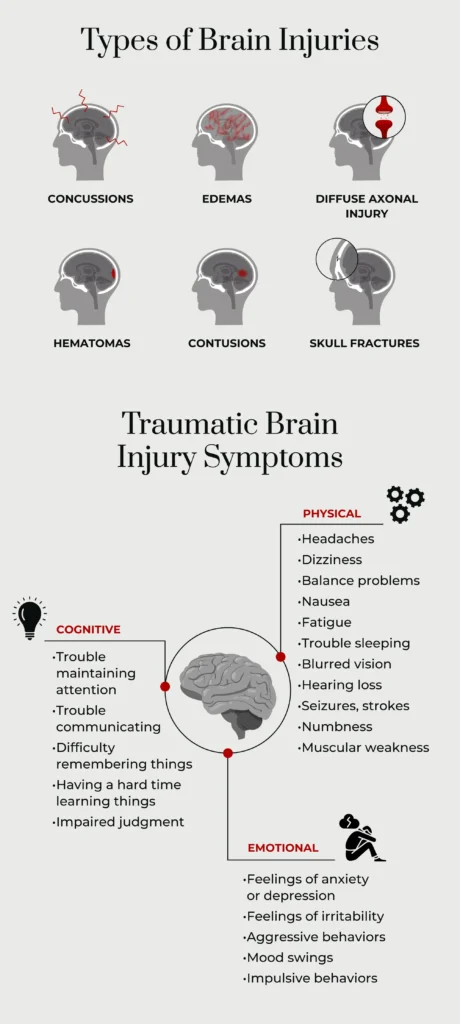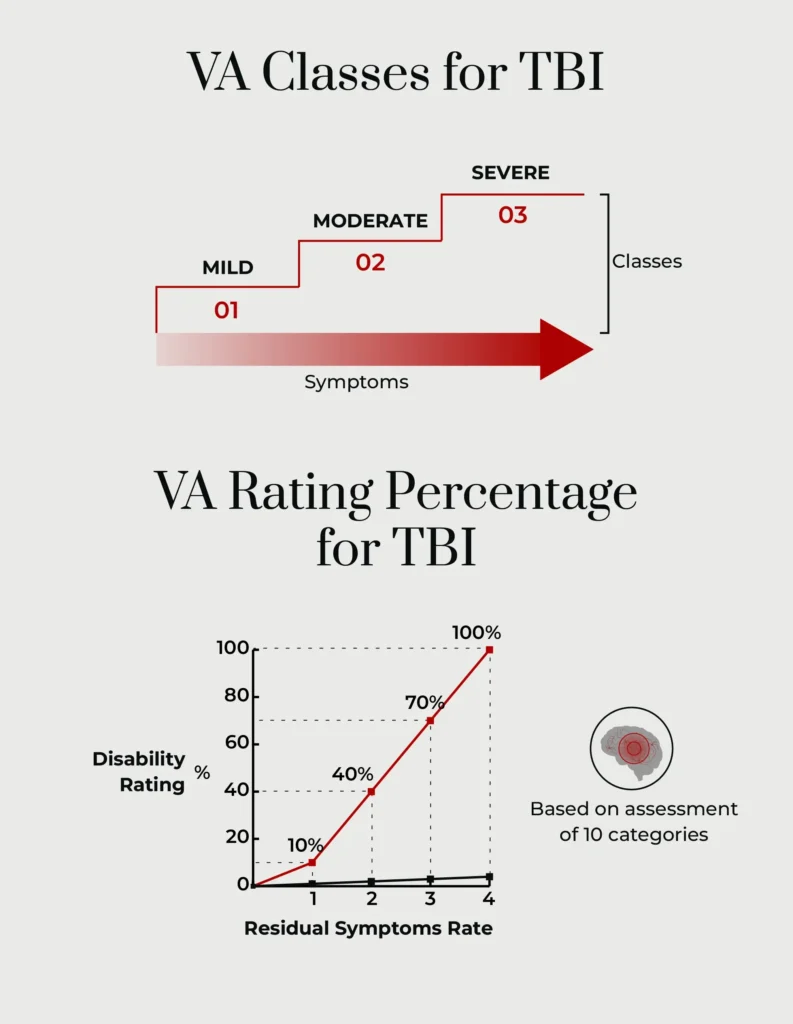Being the recipient of different kinds of physical trauma is an inherent risk in many military occupational specialties. Blows to your head can be particularly serious because of the risk of a traumatic brain injury (TBI).
The U.S. Department of Veterans Affairs (the VA) recognizes TBI as a compensable service-connected disability. Here, we cover what the VA considers when assigning you a TBI VA rating.
As we will see, applying for VA disability benefits for TBI can be a complicated process. If you need help navigating through this process, then setting up a free initial consultation with a VA disability benefits attorney like one of ours at Stone Rose Law is just a phone call or a click away.
A TBI is an injury to your brain that affects how it works. The negative effects on your brain can impact your physical, cognitive, behavioral, and emotional brain functions.
TBI can be mild, moderate, or severe. Its effects can linger with you for a short period of time, perhaps a few months, or they can last the rest of your life.
Veterans, especially those who served in combat and trained for it, are prime candidates for traumatic brain injuries because of the risk factors inherent to military service. In fact, most military TBIs occur from events that do not happen during a deployment.
TBIs affect hundreds of thousands of American veterans, more than 400,000 by some counts. Evidence suggests that one of every five veterans injured during service in Afghanistan and Iraq has experienced a brain injury.
The residual effects of a TBI can affect you in many ways. They can make it hard for you to find, or keep, gainful employment. They can affect how you move, and how you think. They can make it harder to control your moods and emotions, harming your relationships with your family, friends, coworkers, and people in general.
In the most serious cases, a TBI can increase your risk of an early death.
You can receive monthly compensation benefits of anywhere from 0 percent and up through 10 percent, 40 percent, 70 percent, and 100 percent disability ratings. We will cover these disability ratings in more detail below.
It can be tempting to think of VA benefits only in terms of monthly compensation. But the VA has much more to offer veterans with service-connected disabilities. Here are some of the ways that the VA helps veterans in ways other than compensation benefits, even if you receive a 0 percent disability rating:
The VA classifies traumatic brain injuries into three classes based on the seriousness of the associated symptoms. These are mild, moderate, and severe TBI.
Most traumatic brain injuries are mild in nature. They usually come from a blow to your head or even your body that causes your brain to bounce or even twist inside your skull.
A mild TBI can cause you to experience trouble with how you think, behave, and sleep.
Multiple mild TBIs can create cumulative problems that can affect your concentration, give you headaches, cause mild memory loss, and affect your sense of balance.
A moderate TBI differs from a mild TBI in that the effects of a moderate TBI will require ongoing medical treatment for physical and mental health problems.
What distinguishes a severe TBI is its inherent risk of death. Like a moderate TBI, a severe TBI will require ongoing physical or mental health treatment or both.
Depending on the nature of the TBI, its symptoms and effects can vary. Here are some specific kinds of TBI forms that you can suffer from as a result of your military service.
A concussion occurs when the trauma to your head causes your brain to hit the inside of your skull. Concussions are among the most frequently occurring of TBIs and are usually among the less severe kind of TBI. A concussion can lead to symptoms including:
Multiple concussions can have cumulative effects, including second impact syndrome and Chronic Traumatic Encephalopathy, or CTE. The latter in particular is potentially dangerous because it can lead to severe psychiatric disorders that can include suicidal thoughts and behaviors.
The term “edema” describes brain swelling and associated pressure on the brain that happens after you suffer a TBI.
Your brain cells use neural axons to function. Some traumatic brain injuries can damage these axons, which in turn can cause you to lose some brain functionality.
A hematoma is a pooling of blood caused by a ruptured blood vessel in your brain. This pool of blood can form inside your brain, or in the space between the outside of your brain and the inside of your skull.
A contusion describes bruising of the brain tissue. This can occur after the event of an impact.
Skull fractures occur when the skull bone is cracked. The same force needed to cause a skull fracture is often enough to cause any of the other kinds of injuries we have covered here.

We mentioned above that the VA classifies TBI symptoms as being physical, cognitive, behavioral, or emotional. These diagnostic criteria are used to identify some of the specific symptoms you might experience after receiving a traumatic brain injury.
Physical symptoms of a TBI can include any of the following manifestations:
Cognitive symptoms can include the following:
Behavioral or emotional symptoms of a TBI can include:
As mentioned above, the VA rates TBIs at 0, 10, 40, 70, and 100 percent disability levels. In assigning your disability rating for TBI, the VA considers your age, the severity of your injury, its symptoms, and the effect of the TBI on your ability to work and perform day-to-day activities.
It is important to note here that it is not the severity of the event that caused your TBI that the VA considers, but rather the severity and duration of your residual symptoms.
When performing an analysis of your residual symptoms, the VA will assess them using 10 evaluation categories. The result of this assessment will be that the VA will classify your residual symptoms on a scale of 0 to 3, plus one more for total disability. Here is how it works:

Here are the evaluation factors the VA considers in assigning a rating to your residual symptoms:
Once you have established eligibility for VA benefits for a service-connected TBI, another item to consider is whether you are experiencing any other disabilities caused by your TBI condition that can be compensable.
Examples of possible secondary disabilities that can have a source connection to a traumatic brain injury include:
Although traumatic brain injuries often justifiably lead to additional disability claims based on physical symptoms and mental health disorders, you must be careful to avoid what the VA calls “pyramiding,” or using a single symptom to attempt to qualify for multiple disability ratings.
In TBI cases, the risk of pyramiding is greatest when TBI is combined with mental disorders. For example, you may be considered pyramiding if you attempt to qualify separately for a depression disability rating when depression was one of the residual symptoms of yourTBI disability.
An experienced VA disability benefits attorney can help you understand which disability benefits you can properly apply for, separately or as part of a combined VA disability rating.
PTSD is a mental disorder often associated with traumatic brain injuries. Not only are veterans more likely to develop PTSD, but those with TBIs tend to have worse PTSD symptoms.
Generally, the VA will rate your TBI and PTSD as separate disabilities if your TBI involves physical or cognitive residual symptoms.
However, if your TBI symptoms are primarily emotional or behavioral, the VA is more likely to give you a single combined rating for both TBI and PTSD.
If your TBI is severe enough that you require aid and attendance services from another person to avoid needing institutional care, you may qualify for special monthly compensation for TBI known as SMC-T benefits.
If your TBI symptoms require aid and attendance to help perform daily life activities like bathing, feeding yourself, dressing yourself, or taking care of basic bodily functions like going to the bathroom, then you may also be eligible for SMC-T benefits.
A presumptive disability is one that the VA will effectively assume was caused by an underlying, service-connected cause. Exposure to the defoliant called Agent Orange during the conflict in Vietnam is an example of a presumptive disability.
Although TBI is not a presumptive disability, you must apply for and establish your eligibility for TBI benefits like most VA disabilities. TBI can be the source of other presumptive disabilities including:
If you cannot obtain or keep substantially gainful employment because of a TBI disability, you may qualify for total disability compensation from the VA based on Total Disability based on Individual Unemployability (TDIU). TDIU allows veterans to be compensated at the 100 percent rate, even if their conditions do not combine to equal a 100 percent schedular rating.
If the effects of a TBI are not expected to improve, a veteran could be eligible for permanent and total disability (P&T). A P&T rating is 100% and is paid for the rest of the veteran’s life.
You apply for TBI VA disability benefits in the same way you ordinarily apply for a VA disability rating:
First, you must have a present medical diagnosis for a traumatic brain injury.
Second, your TBI must have been the result of an in-service event.
Third, you must establish a medical nexus that links the TBI diagnosis to the in-service traumatic event.
You can prove a service connection to your TBI in a number of ways. This includes sharing your doctor’s TBI diagnosis, your medical records, doctor’s notes, prescriptions, treatment plans, and any other relevant medical evidence. Your doctor will usually write your nexus letter for you.
In addition to your medical history, others who have witnessed the effects of your TBI symptoms on your work activities or personal life can contribute what are colloquially known as “buddy letters” to support your application.
Your doctor will also usually complete a Disability Benefits Questionnaire form for you as part of your benefits application.
Once you have submitted your disability benefits application, the VA can require you to undergo a compensation and pension exam. This involves a VA examiner asking you questions to learn more about your TBI symptoms and will usually include neuropsychological testing.
When the VA completes its evaluation of your benefits application package, it will approve or deny your application. If they approve, then the VA will assign you a single or combined disability rating based on the disability or disabilities you included in your application (most veteran benefits applications claim multiple disabilities).
If the VA denies your application or if it assigns you a disability rating lower than you believe is fair, you can appeal the VA decision.
The expert VA Disability Lawyers at Stone Rose Law are familiar with the TBI benefits application process and can help you prepare it.
If you received VA approval for your claim but feel your rating was made improperly, our military and veterans’ law attorneys are experts in TBI casework and have experience working with the VA to obtain the best possible benefits for our clients.
If you have received a disability rating or combined ratings and want an estimate of the VA monthly compensation benefits you may be eligible for, we have a VA disability calculator you can use. Contact Stone Rose Law today to get started on your TBI claim. Or call us at (480) 498-8998 to talk with an experienced VA disability benefits lawyer.